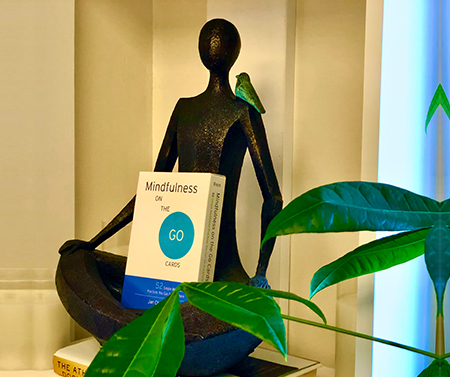Therapy for OCD and Anxiety
When anxiety strikes…
It’s like an unwelcome visitor who appears unexpectedly, often without an invitation.
It’s a restless, uneasy feeling that settles deep in the chest or belly, making even the simplest tasks feel overwhelming.
Sometimes it’s a tightness that constricts breathing, a fluttering heartbeat that won’t slow down, or a racing mind that seems stuck in overdrive.
It’s not just about worry or stress; anxiety can feel like standing on the edge of a precipice, constantly anticipating a fall, even when you’re on solid ground.
Why do I feel anxious all the time?

In today’s hectic, overly-stimulated world, it’s hard not to feel anxious. While anxiety is a normal human response to an overloaded nervous system, it can be very challenging to manage day to day.
Anxiety manifests in different ways for different people: some may experience persistent thoughts that loop endlessly, while others might feel a sense of dread that weighs heavily, making it hard to focus.
It’s an emotional turbulence that can make you question your own safety or worth, despite evidence to the contrary.
Enter: OCD
When anxiety feels overwhelming and out of control, it hijacks your ability to think clearly.
Often, that’s when OCD steps in, offering temporary relief.
Because it works in the moment, you start repeating compulsions over and over.
The irony? The more you rely on compulsions to control anxiety, the stronger anxiety becomes.
It’s like quicksand; the more you struggle to get out of it, the deeper in you sink.
Anxiety is the number one reason people seek therapy. You’ve literally tried everything to ease your pervasive fear and dread, and yet still, it persists. Getting a better sense of the type of anxiety you experience will guide you to get the right type of treatment you need.
 Which type of anxiety is worse for you?
Which type of anxiety is worse for you?
Generalized Anxiety Disorder (GAD) GAD involves excessive, persistent worry about everyday things, such as work, health, relationships, or daily activities. The worries are often disproportionate to the actual situation, and it can feel as if the mind is constantly “on alert” for potential threats. Physical symptoms like muscle tension, restlessness, fatigue, and difficulty concentrating often accompany GAD.
Social Anxiety Disorder (Social Phobia) Social anxiety disorder is characterized by an intense fear of social situations or interactions. You may worry about being judged, embarrassed, or humiliated in front of others. This can lead to avoiding social situations altogether, which may interfere with daily life, work, or relationships. Social anxiety isn’t just shyness; it involves a debilitating level of fear that can cause physical symptoms like sweating, trembling, nausea, or a racing heart in social settings.
Panic Disorder Panic disorder involves recurring panic attacks—sudden episodes of intense fear that trigger severe physical reactions, like chest pain, dizziness, shortness of breath, or feelings of detachment from reality. The attacks often come without warning and can occur even during calm periods. The fear of having another panic attack can lead to avoiding situations where attacks have previously occurred.
OCD: Next Level Anxiety
While GAD, social anxiety and panic disorder are in themselves really unpleasant and disruptive to your daily functioning, Obsessive-Compulsive Disorder (OCD) is a part of the anxiety family, but is in a league of its own.

OCD usually starts in childhood as a way to cope with overwhelming anxiety, creating the illusion of control. When uncertainty or distress feels unbearable, the brain latches onto rituals, repetitive behaviors, or mental checking to soothe the discomfort. Because compulsions provide short-term relief, the brain reinforces them, making the cycle harder to break. Over time, instead of easing anxiety, OCD strengthens it, trapping individuals in an exhausting loop of intrusive thoughts and compulsive responses.
Anxiety affects all of us and is a normal part of life. If your symptoms of anxiety are interfering with your ability to function day to day, impacting your sleeping and eating, or preventing you from things you long to do, like socializing or traveling to far off places, ACT Therapy can help.
 ACT Therapy is the Gold Standard
ACT Therapy is the Gold Standard
Acceptance and Commitment Therapy (ACT) is a proven approach to treating OCD and anxiety effectively, while shifting the focus from trying to “fix” yourself, to living with more purpose and meaning.
Focus on Acceptance ACT is a “paradoxical approach”. Rather than struggle with your anxiety to get rid of it, or act out compulsively to control it, you learn to accept your anxious thoughts and feelings, even if you don’t like them. The irony is, the less you fight to control your anxiety, the less of a problem it becomes.
Mindfulness Techniques Mindfulness helps you observe your anxious thoughts and feelings as they arise, creating a sense of distance between the self and the anxiety. Rather than believing your obsessive thoughts and using compulsions to feel better, practicing mindfulness is a proven way to regulate your nervous system and calm yourself more adaptively.
Psychological Flexibility and Willingness ACT promotes psychological flexibility; an anxiety-busting superpower. Willingness involves being open to experiencing your anxiety while continuing to take actions toward what matters most.
In-person therapy for OCD and Anxiety at Sentient Psychotherapy
Our diverse team of therapists are highly trained in ACT Therapy for OCD and anxiety. Anxiety in all its forms is a highly-treatable condition. Finding a great therapist can be a daunting task, which is why we want to make the process as easy for you as possible.
If you’re ready to start in-person therapy for OCD and anxiety, here’s how the process works:
Call us today at 646-586-3311.
- We will verify your insurance coverage for our services and give you the lowdown on your cost for therapy based on your insurance or self-pay budget.
- Our therapists are highly trained and specialized. We have fee options for you and do our best to work within your budget. Therapy for anxiety is a worthy investment in yourself.
- If you’re cool with the fees, we set up your free, 15 minute consultation with your therapist of choice.
- Schedule your intake session for same week or next week. We do not book more than a week in advance.
- In your first session, you and your therapist will discuss your goals and expectations for therapy. As an evidence-based practice, we want to get you the results you’re looking for. We hold a weekly day/time just for you and expect you to attend your weekly session on time and ready to work.
- Let the transformation begin!
Complete the form below or call us now to begin therapy for OCD and anxiety today: (646) 586-3311

 Which type of anxiety is worse for you?
Which type of anxiety is worse for you? ACT Therapy is the Gold Standard
ACT Therapy is the Gold Standard Call us today at
Call us today at